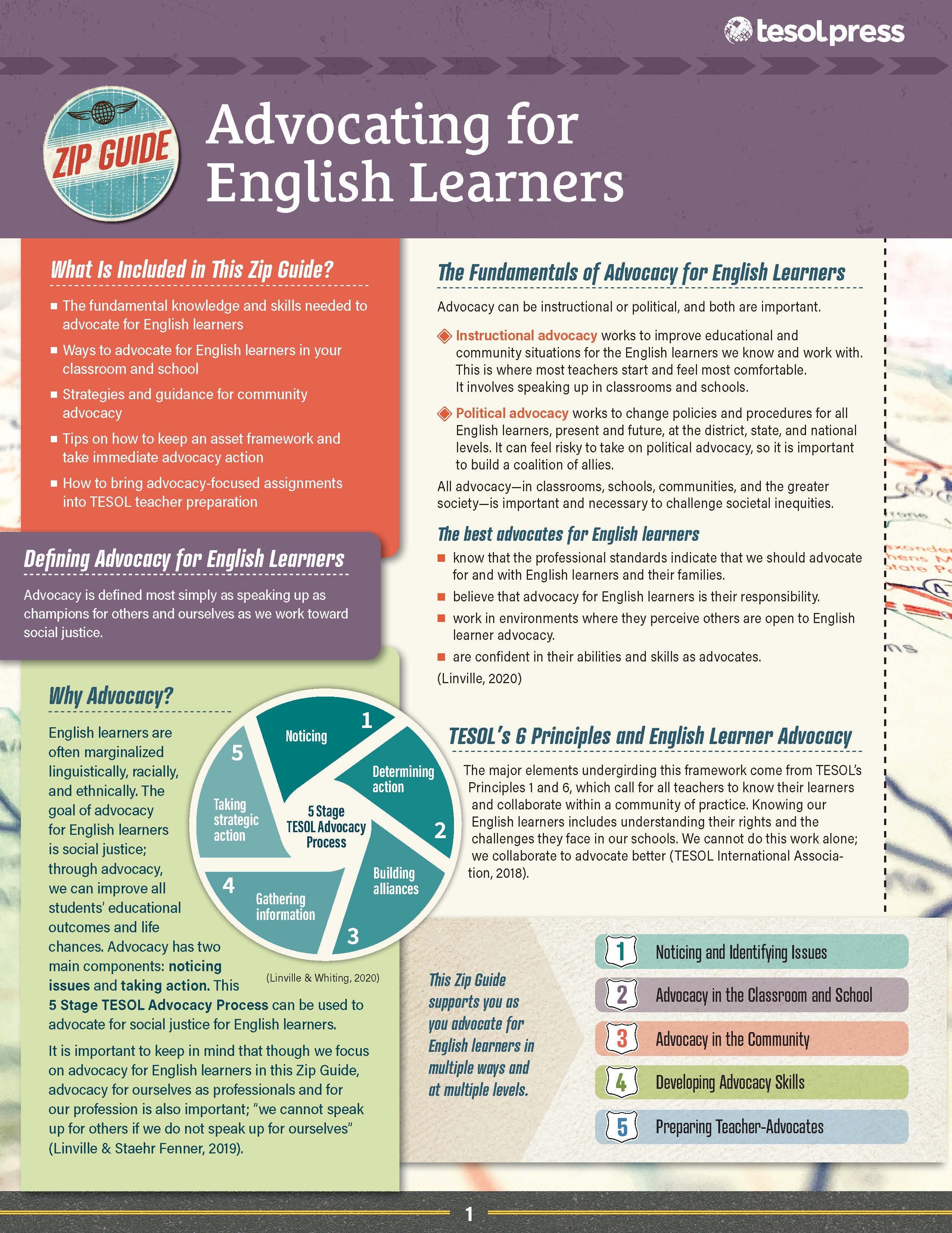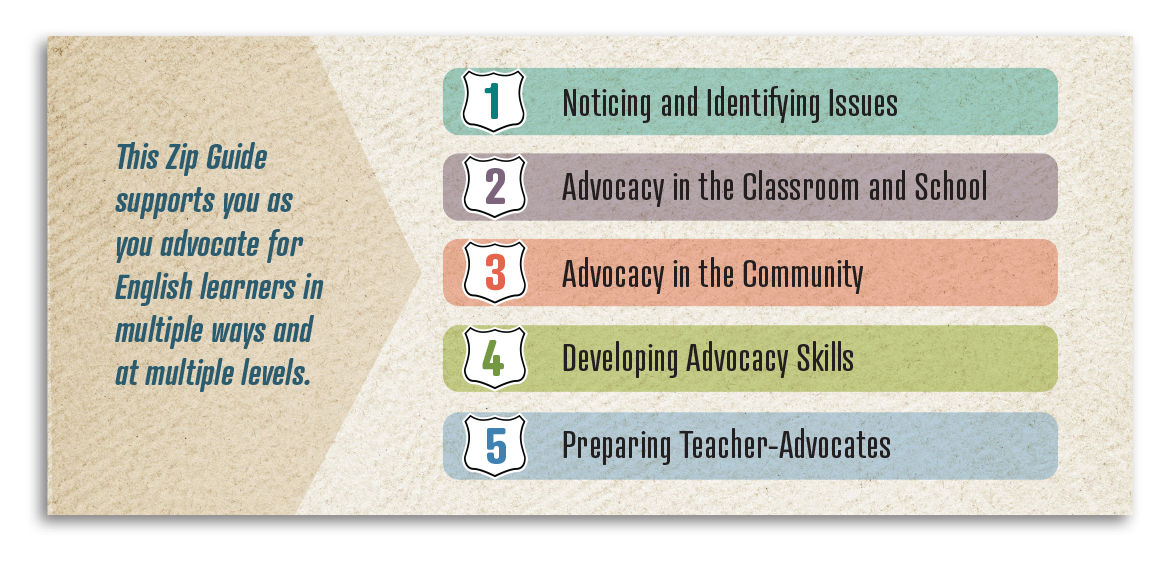
TESOL Zip Guide: Advocating for English Learners
The goal of advocacy for English learners is social justice; through advocacy, we can improve all students’ educational outcomes and life chances. TESOL Zip Guide: Advocating for English Learners is a compact and easy-to-use six-panel resource for English language educators working with kindergarten through adult English learners. The guide presents the five fundamentals needed to advocate for English learners in the classroom and school, strategies and guidance for community advocacy, tips for keeping an asset framework and taking immediate advocacy action, and suggestions for how to bring advocacy-focused assignments into TESOL teacher preparation.
Resources

Below are numerous resources to assist you as you advocate for English learners (ELs), EL families, and the TESOL profession.* Use these resources to guide and inspire your advocacy. Also below are a list of references for the Advocating for English Learners Zip Guide. Use these references as a jumping-off point to deepen your understanding of the vital role advocacy plays in TESOL.
-
The 6 Principles for Exemplary Teaching of English Learners® (TESOL): The 6 Principles are universal guidelines drawn from decades of research in language pedagogy and language acquisition theory. They are targets for teaching excellence and should undergird any program of English language instruction.
-
Power Mapping 101 (NEA): Power mapping is a way to identify who has power in the community, and to figure out what will move those individuals or institutions to do whatever it is you want them to do. It can help you determine community allies and opposition as well as the best ways to communicate.
-
All In! How Educators Can Advocate for English Language Learners (NEA via Colorín Colorado): This guide offers strategies, resources, and step-by-step instructions for navigating the real-life issues educators encounter every day. The guide also features general educators and EL educators who tell stories about the students who inspired them to act.
-
Advocating for English Learners: A Guide for Educators: This book by Diane Staehr Fenner explains techniques of advocacy for ELs.
-
Advocacy in Language Teaching and Learning: This book, edited by Heather Linville and James Whiting, examines the role of advocacy through a social justice lens in a range of contexts, including K–12 classrooms and schools, adult and higher education settings, families and communities, and teacher-education programs and professional organizations.
-
Colorín Colorado Advocacy & Leadership Page: These resources help educators understand the role of EL advocate and offer ideas about where to start as advocates.
-
U.S. Department of Education Office of English Language Acquisition (OELA): OELA provides national leadership to help ensure that English learners and immigrant students attain English proficiency and achieve academic success. In addition to preserving heritage languages and cultures, OELA is committed to prompting opportunities for biliteracy or multiliteracy skills for all students.
-
National Clearinghouse for English for English Language Acquisition (NCELA): Authorized under Title III of the No Child Left Behind Act of 2001, NCELA supports the OELA in its mission to respond to Title III educational needs and implement NCLB as it applies to ELs. NCELA collects, coordinates, and conveys a broad range of research and resources in support of an inclusive approach to high quality education for ELs.
-
U.S. Department of Education Office of Civil Rights (OCR) English Learner Rights Page: Materials on this page include information for students and parents, OCR guidance and resources for education officials about their obligations to EL students and limited-English-proficient parents, and added resources with related information.
-
Dear Colleague Letter: This guidance, issued jointly by the U.S. Office for Civil Rights, the U.S. Department of Education, and the Civil Rights Division at the U.S. Department of Justice, is intended to assist state education agencies, school districts, and all public schools in meeting their legal obligations to ensure that EL students can participate meaningfully and equally in educational programs and services.
-
Court Rulings Regarding English Learners (Colorín Colorado): In this excerpt from Foundations for Teaching English Language Learners: Research, Theory, Policy, and Practice (Caslon, 2010), Wayne Wright summarizes the landmark U.S. court cases that have had significant implications for ELs.
-
“How Immigration Benefits Americans and Is Key to US Leadership in the World” (HuffPost): This article by Samier Mansur explains the benefits immigrants bring to the United States and supports the development of an asset-focused lens in advocacy work.
-
Guide for Engaging with English Learner Families (Colorín Colorado): This guide offers twenty big ideas to help school leaders get started on the path towards a strong home-school partnership.
-
TESOL’s Advocacy Action Center: TESOL’s advocacy program addresses issues that affect the profession worldwide and offers English language educators the opportunity to get involved.
-
English Learners and ESSA: What Educators Need to Know: This TESOL Resource Kit is designed to help TESOL members learn about the essential components of the ESSA, which is the reauthorized Elementary and Secondary Education Act (ESEA; formerly known as No Child Left Behind).
-
MATSOL’s Advocacy Page: The Massachusetts Association of Teachers of Speakers of Other Languages. MATSOL’s mission is to promote equity and excellence in the education of English language learners of all ages, and in all program models. (Many TESOL Affiliates have similar advocacy-focused pages)
-
Learning for Justice Immigration Page: Learning for Justice (formerly Teaching Tolerance) provides immigration resources to help teachers accurately teach about immigration and offer undocumented and EL students resources and support.
-
Unlocking Your Community’s Hidden Strengths: A Guidebook to Community Asset-Mapping (Southern Poverty Law Center): This guidebook helps you put the principles of community asset-mapping into action.
-
“Parent University: Adults Hone Skills for Stronger Kids, Communities” (Education World): This article discusses how some schools are offering “Parent University” workshops and seminars to help parents better understand and deal with kids.
-
Deferred Action for Childhood Arrivals (DACA) (National Immigrant Law Center): This page provides guidance on how to apply for DACA, renew DACA, and other important information on DACA.
-
TESOL CAEP P-12 Standards: The Standards for Initial TESOL Pre-K–12 Teacher Preparation Programs outline the unique content, pedagogical knowledge, and skills necessary to prepare effective Pre-K–12 TESOL educators in the United States, including knowledge of strategies to advocate for ELs, as well as ability to apply that knowledge.
-
Heather Linville: Dr. Linville, coauthor of the TESOL Advocating for English Learners Zip Guide, is associate professor and director of TESOL at the University of Wisconsin, La Crosse.
-
James Whiting: Dr. Whiting, coauthor of the TESOL Advocating for English Learners Zip Guide, is professor of applied linguistics and coordinator of the graduate TESOL program at Plymouth State University.
*Note: The description text for most of these resources comes directly from the source.
References
Castañeda v. Pickard, 648 F.2d 989 (1981).
Civil Rights Act of 1964, Pub. L. No. 88-352, 78 Stat. 241. (1964). https://www.govinfo.gov/app/details/STATUTE-78/STATUTE-78-Pg241
DREAM Act of 2021, S. 264, 117th Congress. (2021). https://www.congress.gov/bill/117th-congress/senate-bill/264?q=%7B%22search%22%3A%5B%22dream+act%22%5D%7D&s=1&r=4
Consideration of Deferred Action for Childhood Arrivals. (2012, 2021). https://www.uscis.gov/DACA
Equal Educational Opportunities Act, 20 U.S.C. §§ 1701–1758. (1974). https://uscode.house.gov/view.xhtml?req=granuleid%3AUSC-prelim-title20-chapter39&saved=L3ByZWxpbUB0aXRsZTIwL2NoYXB0ZXIzOS9zdWJjaGFwdGVyMQ%3D%3D%
7CZ3JhbnVsZWlkOlVTQy1wcmVsaW0tdGl0bGUyMC1jaGFwdGVyMzktc3ViY2hhcHRlcjE%3D%7C%7C%7C0%7C
false%7Cprelim&edition=prelim
Every Student Succeeds Act, 20 U.S.C. § 6301 (2015).
https://www.ed.gov/essa?src=rn
Hesson, S., & Toncelli, R. (2019). Making the path by walking together: A collaborative approach to advocacy. In H. Linville & J. Whiting (Eds.), Advocacy in English language teaching and learning (pp. 147–157). Routledge.
Kennedy, D. (2019). A framework for asset-focused advocacy in adult ESL education in English language teaching and learning. In H. Linville & J. Whiting (Eds.), Advocacy in English language teaching and learning (pp. 133–146). Routledge.
Lau v. Nichols, 414 U.S. 563 (1974)
Linville, H. (2020). A closer look at ESOL teacher advocacy: What we do and why. TESOL Journal 11(3). https://doi.org/10.1002/tesj.508
Linville, H., & Staehr Fenner, D. (2019). Preparing teachers to be advocates for English learners. In L. de Oliveira (Ed.), The handbook of TESOL in K–12 (pp. 341–355). Wiley.
Linville, H., & Whiting, J. (2020). Social justice through TESOL advocacy. TESOL Journal 11(4). https://doi.org/10.1002/tesj.553
Plyler v. Doe, 457 U.S. 202 (1982)
Ruiz, R. (1984). Orientations in language planning. NABE Journal 8(2), 15–34.
Staehr Fenner, D. (2013). Advocacy for English learners. Corwin Press.
TESOL International Association. (2018). The 6 Principles for exemplary teaching of English learners: Grades K–12. TESOL Press.
TESOL International Association. (2019). Standards for initial TESOL Pre-K-12 teacher preparation programs. https://www.tesol.org/docs/default-source/books/2018-tesol-teacher-prep-standards-final.pdf?sfvrsn=23f3ffdc_6
Whiting, J. (2019). Beyond the philosophy statement: Bringing advocacy center stage in TESOL teacher education. In H. Linville & J. Whiting (Eds.), Advocacy in English language teaching and learning (pp. 31–43). Routledge.

